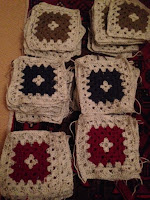As threatened last month, I’m going to write about
crochet. Which feels quite comforting right now.
I learned to crochet as a student, one wet July
afternoon, when my friend’s granny taught us both. Good old Nanny Spence; she
didn’t know what she had started. I crocheted my way through my finals – a big
blanket, all purples and pinks, that, like Topsy, just ‘growed’. The result was cheerful but didn’t bear close
inspection. Rather like the way I wrote in those days – for fun, without much
planning or structure. I had the ambition to be a Real Writer, but neither the
life experience nor the application to do anything much about it.
Since then I have kept crocheting – baby
blankets, hats (many of my writer friends have my hats!), and the occasional
big blanket. I always loved the idea of making
a patchwork blanket in little squares, but the reality of making many smaller
squares and joining them together seemed like too much faffing. All that
stopping and starting; all that joining together. Too much like hard work. Like
a novel, really. I often started one, and then just kept crocheting – I would
still have a blanket, but not a patchwork one, just a giant square.
But I can write novels. Why shouldn’t I have
the stamina for a patchwork blanket? I wanted to make one for my friend Emma: I
could see it in my mind’s eye, the way I might see a finished novel – something
perfect and wonderful. And this time I was determined to go through with it. And
quickly: I wanted her to have it for winter nights.
I bought
lovely Aran wool, had fun choosing colours, cast on. Gosh, though, such an undertaking! How could this ever grow
into a blanket? How could I be bothered to make so many little squares? But writing novels has taught me that the smallest idea, the
tiniest stitch, can grow and become something different.
October was a busy month with lots of
travelling by train. Was it worth the hassle of carrying such a big bag with
four huge balls of wools? Yes: trains are good places to crochet; so are
hotels, and gradually one square became four, became twenty. I knew now that,
like a novel which had been hoisted over the 10,000 word barrier, I wasn’t going
to give up this time. After all, what else could I do with a heap of little
squares only make them into a real thing? I applied myself the way I do to a novel. I didn’t allow myself to watch TV without a
crochet hook in my hand; I crocheted at family dinners; at music sessions
between my songs and during tunes I didn’t know. (Luckily I don’t mind in the
least being thought odd – something else being a writer has taught me.)
 Finally I had the sixty squares I had
calculated I would need. This felt like an ending – like the completion of a
first draft. But of course the hard work started here – a lot of sewing; making
sure the squares were arranged properly; making some mistakes and having to
unpick; realising the result still had an unfinished look – another ‘edit’
would be needed. Like a novel approaching completion, small changes at this
stage seemed to make a big difference.
Finally I had the sixty squares I had
calculated I would need. This felt like an ending – like the completion of a
first draft. But of course the hard work started here – a lot of sewing; making
sure the squares were arranged properly; making some mistakes and having to
unpick; realising the result still had an unfinished look – another ‘edit’
would be needed. Like a novel approaching completion, small changes at this
stage seemed to make a big difference.
And then it was done. And it is beautiful. It
isn’t quite how I envisaged it – none of my finished novels ever have been,
either. There are little flaws; I can see them, but hopefully Emma won't.
Part of me wants to put it on my bed and enjoy
it – look how pretty it is! – and think about how I made it. But it’s not for
me, so like my novels, off it goes into the world.
It started with an idea, and one single stitch, and it took a lot of hard work to make it into a thing. Just like a book.






Lovely! My great gran crocheted all the time, and we still have two big blankets that she made.
ReplyDeleteLove it! Crochet as writing metaphor! Colleen :) xo
ReplyDeleteGreat analogy, Sheena! And the two skills go together rather well, too - while you're crocheting, your mind can be busy plotting the novel.
ReplyDelete